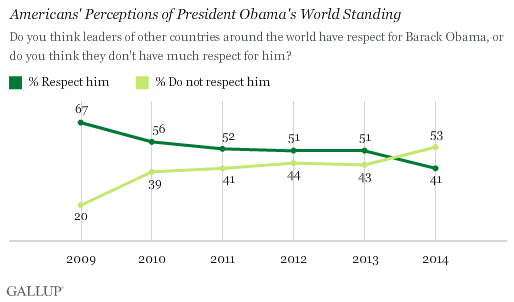A tectonic shift since the heady days of Hopenchange, and a direct reversal of last year's numbers:

Why the dramatic drop? Part of it is the president's general unpopularity, which is infecting any number of poll results about his policies and standing. A December survey from Pew Research showed Obama hitting new lows on foreign policy questions, with a majority describing his international posture as "not tough enough." The public's attention may be heavily focused on the economy and healthcare at this point in history, but there appears to be a growing sense that among this administration myriad failures is a conspicuous whiff on Obama's pledge to "restore America's standing" in the eyes of the world. I discussed this poll on Fox News last evening:
As was mentioned, I don't necessarily equate concerns over perceived weakness with an expanded appetite for military intervention. The public was extremely cold on strikes against Syria and holds a more negative view of America's "good war" than ever before. But that doesn't mean Americans will tolerate international humiliations or foreign policy incoherence. Does anybody believe that America has enhanced its ability to pursue and advance our national interests abroad during this presidency? The administration's most high-profile gambits in the international arena have ended in utter failure. The Russian "reset" began with a foolish gaffe, and deteriorated from there. Obama's Libya intervention, done "from behind" and without Congress' consent helped uproot a madman's regime, but left madness in its wake. Our position on the ground in the post-Gaddafi failed state was so weak that we couldn't protect our own people, which invited a disastrous outcome. The administration looked vacillating and powerless throughout Egypt's turbulent upheaval.
In Syria, the president drew a red line on chemical weapons, then seemed paralyzed when it was flagrantly crossed. He was going to authorize a strike, but wouldn't Congressional permission. Then he wanted Congress on board, until it became clear that the votes weren't there. He wanted to arm the "moderate" rebels, but that plan fell to pieces. Cornered, he eventually agreed to a disarmament "deal" birthed by a John Kerry mistake, and seized upon by Putin and Assad. The Syrian regime has failed to live up to its end of the bargain, leading the accidental author of this "compromise" to concede that it isn't working. The carnage continues in Syria, with no acceptable WMD resolution in sight. And with all of that as a backdrop, Obama is also chasing a grand bargain with the world's leading state sponsor of terrorism, Iran -- arguably the least trustworthy potential "peace partner" on planet earth. (Also recall that Syria is Iran's top ally in the region). The president is doing so without Congressional threats of stepped-up sanctions strengthening his negotiating hand, upsetting many within his own party. Obama's initial play vis-a-vis Iran was so insufficient that even the French balked at it. Meanwhile, our "peace partners" are publicly contradicting the administration's assurances about the deal's contents (which remain secret), boasting that they haven't agreed to dismantle even one solitary element of their illegal nuclear program. Foreign leaders, historically friendly and hostile alike, are watching and taking note all the while -- which helps explain how Americans have drawn their conclusions regarding global perceptions of our current leadership.
